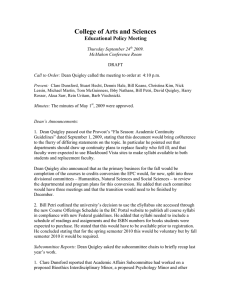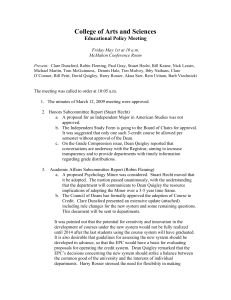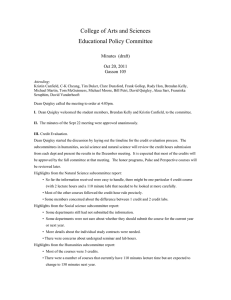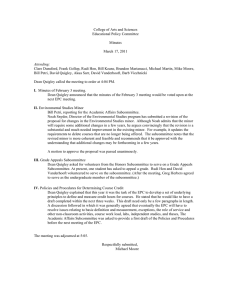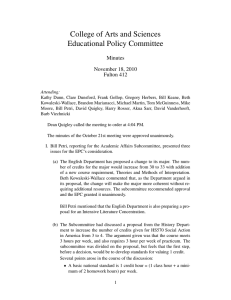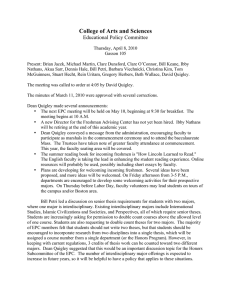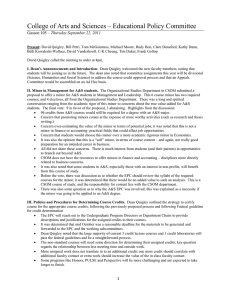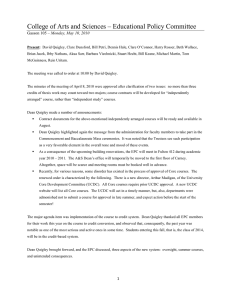College of Arts & Sciences Educational Policy Committee Minutes of the 414 Meeting
advertisement
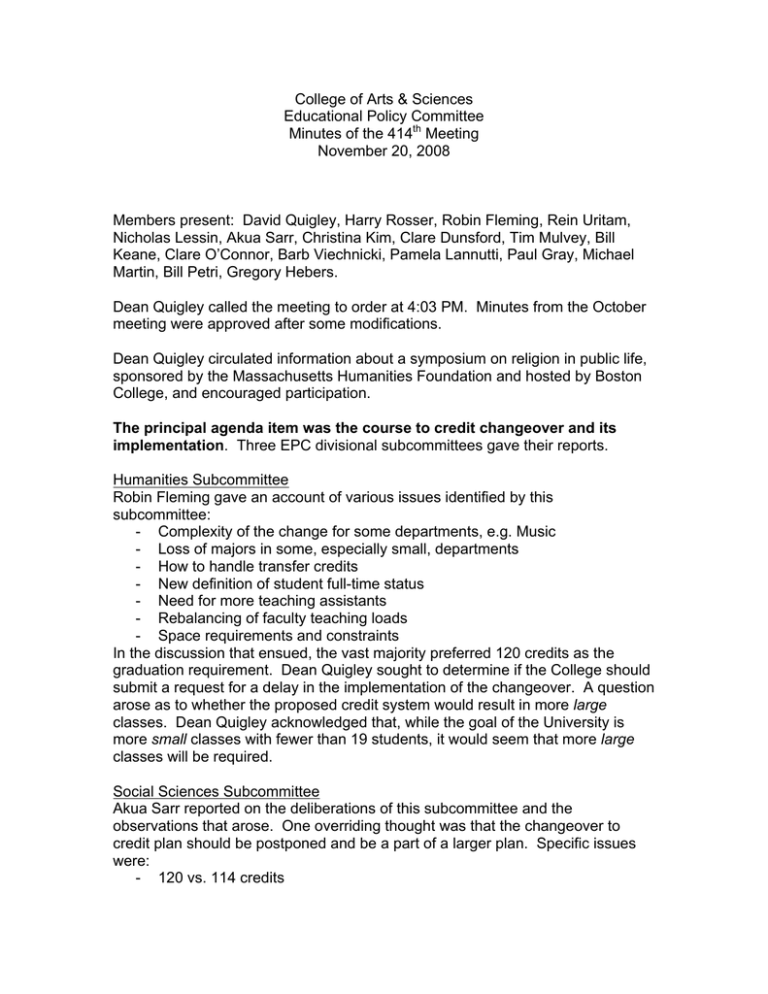
College of Arts & Sciences Educational Policy Committee Minutes of the 414th Meeting November 20, 2008 Members present: David Quigley, Harry Rosser, Robin Fleming, Rein Uritam, Nicholas Lessin, Akua Sarr, Christina Kim, Clare Dunsford, Tim Mulvey, Bill Keane, Clare O’Connor, Barb Viechnicki, Pamela Lannutti, Paul Gray, Michael Martin, Bill Petri, Gregory Hebers. Dean Quigley called the meeting to order at 4:03 PM. Minutes from the October meeting were approved after some modifications. Dean Quigley circulated information about a symposium on religion in public life, sponsored by the Massachusetts Humanities Foundation and hosted by Boston College, and encouraged participation. The principal agenda item was the course to credit changeover and its implementation. Three EPC divisional subcommittees gave their reports. Humanities Subcommittee Robin Fleming gave an account of various issues identified by this subcommittee: - Complexity of the change for some departments, e.g. Music - Loss of majors in some, especially small, departments - How to handle transfer credits - New definition of student full-time status - Need for more teaching assistants - Rebalancing of faculty teaching loads - Space requirements and constraints In the discussion that ensued, the vast majority preferred 120 credits as the graduation requirement. Dean Quigley sought to determine if the College should submit a request for a delay in the implementation of the changeover. A question arose as to whether the proposed credit system would result in more large classes. Dean Quigley acknowledged that, while the goal of the University is more small classes with fewer than 19 students, it would seem that more large classes will be required. Social Sciences Subcommittee Akua Sarr reported on the deliberations of this subcommittee and the observations that arose. One overriding thought was that the changeover to credit plan should be postponed and be a part of a larger plan. Specific issues were: - 120 vs. 114 credits - 3-credit vs. 4-credit courses - 4 vs. 5 courses per semester for a student - Study abroad courses - Honor programs - AP credit allocation In the discussion that followed, Dean Quigley noted that there is a desire for more 4-credit courses, as it is the norm at top universities. He also distinguished between those things in the implementation phase that needed to be done by September 2009, and those, like new requirements for a major, that could be done later. Some members wondered if there exist broadly accepted definitions for allocating a number of credits to a course. Others suggested an “exercise” whereby each department simply translates its current major requirements into its equivalent in the number of credits, in order to view the results. Natural Sciences Subcommittee Bill Petri reported on the points that arose from this subcommittee, including: - Unanimous preference for 120 credits - Preference for 4 vs. 5 courses per semester in the sciences - “Easy” translation of major from course to credit - Likely need to alter the current core The subsequent discussion involved various issues. There is currently an attrition in science majors because of the heavy course load. Dean Quigley asserted that surely the University will make the change from course to credit before any change in core requirements. Members from the science departments pointed out that, in the new credit system, a science major will occupy a greater percentage of a student’s overall college education, thereby decreasing the student’s exposure to courses outside his or her science major. Others pointed out a potential conflict between 3-credit course majors, such as Philosophy, and 4-credit majors, such as perhaps History, in this new plan, especially as this conflict affects a double major. Dean Quigley distributed a table for implementation by Arts & Sciences, following the currently promulgated schedule, the “fast” Plan A, and an alternative “slow” Plan B. The latter would delay full implementation of the credit system from fall 2010 by one year, to fall 2011. He wondered if it would be useful to invite Don Hafner, the Vice Provost for Undergraduate Education, to a future meeting. Members discussed which edition of the University catalog becomes the “contract” for major requirements for an incoming student. Other points arose. There is a need for feedback from departments. A profusion of 1- and 2-credit courses can lead to a fragmented course of study. What will be the definition of a full load, and of good academic standing for student? The conclusion of this lengthy discussion was that Dean Quigley will request more time for implementation of the change from a course-based to credit-based system, basically following the sequencing in “Plan B”. At the next meeting in February, the EPC will consider developments and decisions at the College and University level, such as the possible 120-credit requirement, and also hear what is happening at the Department level. The second major topic was presented by Michael Martin, representing the Honors Subcommittee of the EPC. He distributed an interesting report to the EPC prepared by his committee three years ago on the subject of grade compression. The report included facts such as 40% of grades in the College are either A or A-. The report also made recommendations, such as reports to faculty on their grade distribution spectrum. In the ensuing discussion, the usual issues arose. “Our grades are high because our students are so superior.” “There should be a new notation of “distinction” over and above normal grades.“ “Do we grade by a national or local standard?” “We should eliminate plus and minus on grades.” “New faculty should be instructed in grading standards and practices.” “Students will not take courses with tough grading standards because their GPA matters for jobs and graduate school.” Dean Quigley recommended that the College distribute to each faculty member the College-wide spectrum of grades, so that this could be compared with individual grading patterns. The meeting was adjourned at 5:32 PM. Respectfully submitted, Rein Uritam
